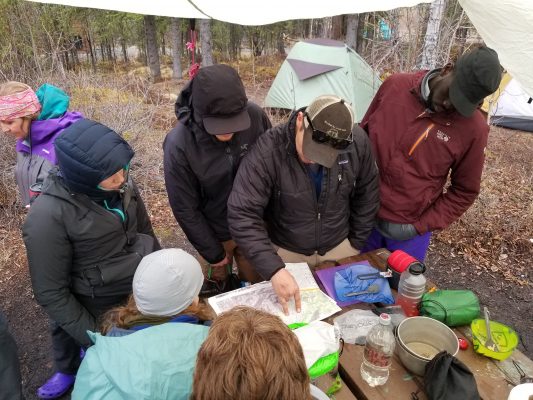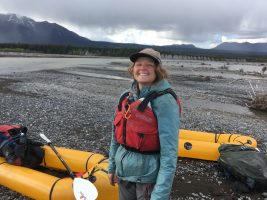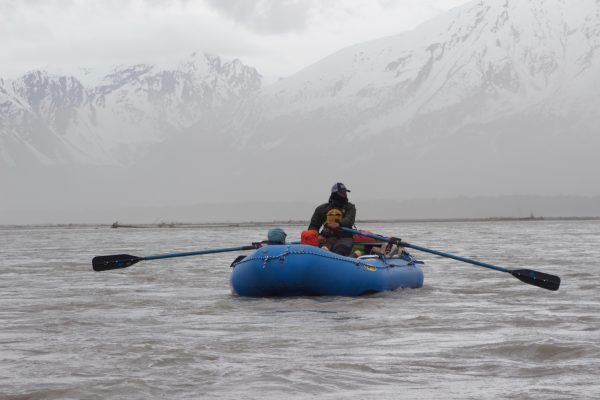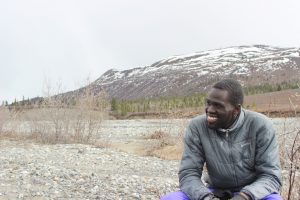Student expedition course tackles Wrangell-St. Elias
by joey |
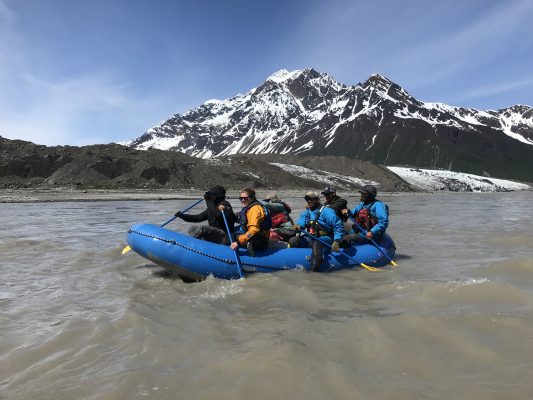
Students in PEP 467: Land and Water-based Leadership on their 20-day backcountry expedition course this summer. (Photo courtesy Erin Cutts / Prince William Sound College)
Eleven students swapped term papers for topo-maps and homework for hailstorms this summer in PEP 467: Land and Water-based Leadership, traversing Wrangell-St. Elias National Park and Preserve on a course they designed together in the spring.
Twenty days in the wilderness. 60-pound packs. 15-hour hikes on blistered feet doctored with duct tape. How's that for summer vacation?
The expedition course is an intermittent offering from the Department of Health, Physical Education and Recreation (HPER), part of the physical education degree program. Though the department offers several shorter excursions each semester, the expedition course puts an entirely new level of responsibility on its participants.
"[Outdoor Leadership students] get to develop and plan it, whereas all the other courses they are more or less a participant," explained T.J. Miller, HPER department director. In addition, he said, students are assigned leadership roles throughout the course. Plus, no other class comes close to 20 days in the field. The expedition - only open to upperclassmen - effectively combines all the skills, theory and leadership classes outdoor recreation students take toward their undergraduate degree.

T.J. Miller, foreground, chats with Jesse Munday on the trail. (Photo courtesy Erin Cutts / Prince William Sound College)
Miller selected a general region for this year's expedition, and students took the reins from there. During a one-credit course in the spring, each participant managed a different part of the planning process, checking in on Wednesday nights to hammer out a route and update each other on their progress. Some handled permits with the National Park Service, others coordinated and checked equipment. Some developed group meal plans while others developed a risk assessment strategy. On the side, students dehydrated meals and many even built their own pack rafts.
Though Miller directed the spring and summer courses, the 11 students collectively controlled most decisions. The class hit the trail on May 20 from the end of Nabesna Road. By June 10, the students and professors would hike nearly 150 miles and float another 90 down the Copper River.
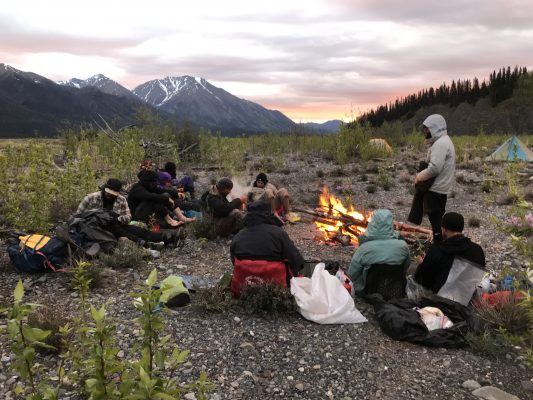
Another day winds down on the 20-day expedition course. (Photo courtesy Erin Cutts / Prince William Sound College)
Into the woods
"It was nerve-wracking the day before [we left]. I was so freaked out," recalled Monika Fleming, a geology and interdisciplinary studies double major, with a focus on outdoor recreation. "After day one, it all came together. We were lucky we were well-prepared because we got thrown a million curveballs."
For starters, she said, the group woke up under two inches of snow the first morning. Then there was hail and thunder and icy rapids to contend with. After three days of pack rafting and hiking, they approached Cooper Pass, still heavily snowed in after a strong winter.
"[The pass] was maybe the distance from the library to the Natural Sciences Building but it took us four or five hours," Monika recalled. "You would just take a step and the packs were so heavy you would just sink down to the top of your thighs."
Slowed by snow, the group decided to change the itinerary, checking topographic maps for new routes and possible rivers to raft. But their pre-decided course structure never wavered.
Two students served as leaders each day, starting the morning with stretches, readings or motivational pep talks. They outlined the day's itinerary, assigned group roles, addressed any risks ahead. On trail, they chose break times and durations. Leaders led a debrief each night, creating a safe space to hash out group conflict, and handing the reins to the next day's leaders.
After circumnavigating Nutzoni Mountain - with a rest day in the village/ghost town of Chisana - the group piled in the van to start phase two. They unloaded rafts in Chitna and floated down the Copper River, with its shifting riverbanks and downed trees dragging the surface. Everyone guided the group boats at some point; everyone cooked a group meal along the way.
After nearly three challenging, incredible weeks in the wilderness, the students met their pre-arranged van at the 36-mile bridge in Cordova and shuttled into town. They shared one last dinner together - laughing over trip highlights, sharing pictures, enjoying each other's company - and an evening derigging boats and cleaning gear. In the morning, they ferried back to Anchorage.
"Everything's just enhanced"
A unique class like this comes with its own unique takeaways.
Monika credited the class for its experiential education benefits. "True application is a great way to learn things and learn them fast and well," she said, "especially when you're comfort depends on it."
The class, she added, also gave her a renewed perspective on her day-to-day life. "You're walking through these tussocks and you're always wet and cold and you're just grateful when you go to bed in your tent," she said. Simple food tastes delicious. Sleeping bags feel luxurious. "Everything's just enhanced."
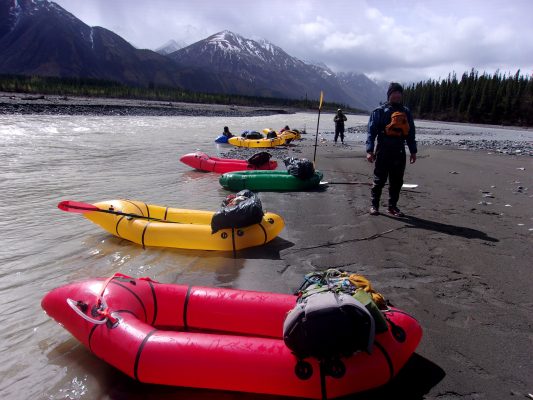
Students built their own pack rafts as part of the spring planning course. (Photo courtesy T.J. Miller / University of Alaska Anchorage)
As the culminating class for outdoor recreation students - many of whom had taken a dozen classes together - the expedition course provided one last chance to lean on each other.
"You're consulting each other, supporting each other, all toward a common goal," Monika noted. "I would never have done that [trip] on my own."
She actually left on another expedition later that summer, where, she said, "I'm not kidding you, all the weakness was taken out of me." That's what 20 days wet, cold and stomping through alders will do.
"Being out there for 20 days is such an amazing experience. You're able to push yourselves further than you think you can," added Reth Duir, an interdisciplinary studies major with an outdoor education focus. "I was able to do things I hadn't really done before, like risk management, how to write an emergency response plan, how to locate emergency services within Wrangell-St. Elias. I'm just really blessed being given the opportunity to be out there and get that full wilderness experience," he said.
The expedition course isn't for everyone (in fact, it's only open to outdoor leadership students nearing graduation), but the HPER department offers plenty of beginner classes, like sea kayaking, ice climbing and river rafting.
"Whether you're an education major, you're an arts major, a mathematics major, whatever, get out and just enjoy Alaska's public lands," Reth said. "[HPER classes] are a great way to continue to take courses, whatever department you're in, but also just enjoy your time at University of Alaska Anchorage."
The next expedition course is currently slated for 2020. Click here to learn more about the HPER department.
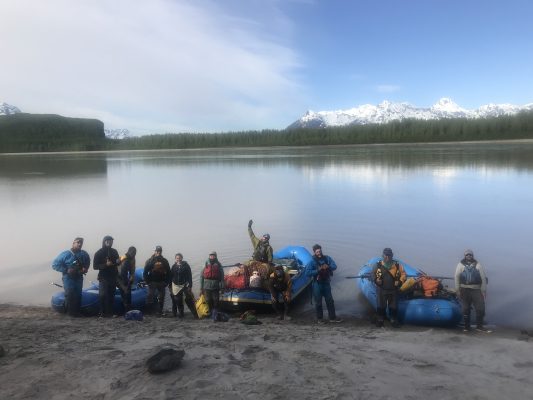
Participants on the 2018 HPER expedition course. (Photo courtesy Erin Cutts / Prince William Sound College)
Written by J. Besl, UAA Office of University Advancement
Student Stories
Research
Events and Highlights
Alumni
In the News
Awards
Community
COVID-19
Diversity, Equity, and Inclusion










